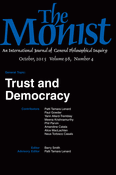-
Views
-
Cite
Cite
Alice MacLachlan, “Trust Me, I’m Sorry”: The Paradox of Public Apology, The Monist, Volume 98, Issue 4, October 2015, Pages 441–456, https://doi.org/10.1093/monist/onv023
Close - Share Icon Share
Abstract
Our attitude to official apologies is paradoxical. Despite widespread critique of most apologies issued by heads of state, government, and NGOs, public demand for such apologies continues to arise with predictable regularity—we demand even as we condemn. I argue that the role of apologies in securing public trust in a democratic context can explain this paradoxical attitude. By contrasting private and public apologies, I demonstrate that the latter have emerged as a performative (rather than legal or structural) model for accountability, and thus for reinspired public trust. I conclude by demonstrating significant democratic risks to this practice.



